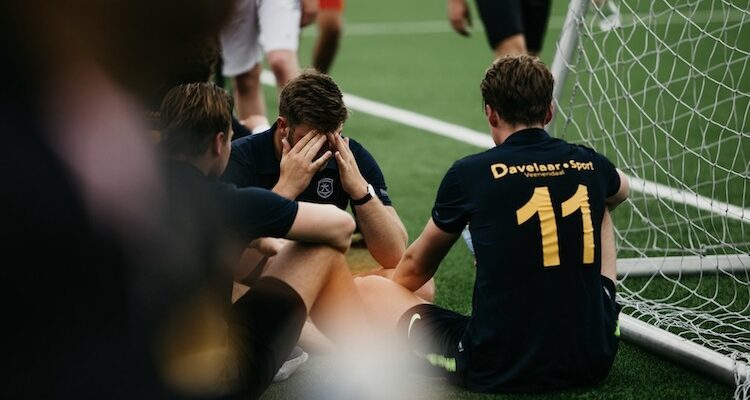Internal Family Systems (IFS), also known as “parts work”, is a mindfulness-based approach to self-acceptance and somatic awareness. IFS helps people navigate competition and life with the 8 Cs: confidence, calm, compassion, courage, creativity, clarity, curiosity, and connection. IFS has proven to be highly effective for quieting the inner-critic, resolving inner conflicts, and slowing emotional reactivity.
[Read more…] about What does it mean to take an Internal Family Systems (IFS) Approach?How to Bounce Back from Adversity in Sports
To learn how to overcome defeat and bounce back from adversity in sports, it can be helpful to look back through history at the greatest athletes of all time.
History is full of stories about athletes that have been cut from teams, experienced heartbreaking losses, and devastating injuries. However because the focus is usually on the career highlights of the winners, the heroic stories of their persevering journeys are often missed.
Michael Jordan was famously cut in high school from his varsity basketball team in the 10th grade. Later in his career, Jordan reflected back on the experience, “It was embarrassing not making that team. They posted the roster and it was there for a long, long time without my name on it. I remember being really mad, too.” The experienced seeded his famously resilient work ethic. “Whenever I was working out and got tired and figured I ought to stop, I’d close my eyes and see that list in the locker room without my name on it and that usually got me going again.” Jordan finished his career as a global icon named MVP of the NBA Finals 6x with 6 NBA championship rings, 2 Olympic Gold Medals, and widely acclaimed as the NBA’s the greatest basketball player of all time.
I’ve missed more than 9,000 shots in my career. I’ve lost almost 300 games. Twenty-six times I’ve been trusted to take the game-winning shot and missed. I’ve failed over and over and over again in my life. And that is why I succeed.
Michael Jordan, The GOAT
The experience of getting cut from a team or sidelined, and bouncing back stronger is not a unique narrative for elite athletes. The list goes on and on.
Bill Russell was cut from his junior varsity basketball team in high school and mostly ignored from college recruiters prior to winning 11 NBA Championships.
Abby Wambach suffered devastating World Cup losses in 2003, 2007, and 2011 before eventually accomplishing her dream of winning the 2015 FIFA Women’s World Cup at the end of her soccer career.
Crystal Dunn was the very last player cut from the US Women’s 2015 World Cup roster. She described the experience, “getting that phone call and being told you’re not going to the World Cup was soul crushing. I really doubted myself in that moment…I had to make the decision to pick myself up, dust myself off, just get back to work and enjoy the game again.” Four years later, in 2019, Dunn became a FIFA World Cup Champion. In 2021 she was the only American World Cup player to start in every match at the Summer Olympics in Tokyo.
Tom Brady was looked over in the first 5 rounds of the 2000 NFL draft. Eventually selected as pick number 199, Brady was the 7th quarterback selected in the NFL draft that year. Two years later Brady led the New England Patriots to a Super Bowl in 2002. He would go on to win 7 Super Bowls in throughout career.
If you were recently cut or sidelined, you are in good company. It hurts now but might just be the extra fuel you need to sustain in the future. All of these athletes maintained a growth mindset to work harder and come back stronger. Take a tip from MJ, Wamback, Dunn and Brady. All of these athletes are examples of overcoming adversity in sports before rising to the top. It is the history of failures that pave the way to future success.
Do you know of other comeback stories about great athletes? I want to hear them! Drop me a line and share stories about famous athletes coming back from being cut.
Must Read Sport Psychology Books for Athletes, Coaches & Teams
This is not your typical reading list of sport psychology books. I want to start by acknowledging that there are a ton of fantastic books out there on mental toughness, navigating pressure, and overcoming mental obstacles for athletes in sports. The problem is that most of them are written by men about male professional athletes.
I have always enjoyed reading the books of Hall of Fame level coaches such as John Wooden’s A Lifetime of Observations and Reflections On and Off the Court, Phil Knight’s Shoe Dog and Pete Carroll’s Win Forever . There are also fantastic books by sport psychology giants such as George Mumford’s The Mindful Athlete and Timothy Galloway’s classic The Inner Game of Tennis. I have deep respect for these sports legends. However, the experiences they describe in the books often feel otherworldly to female high school and collegiate athletes or coaches who don’t have access to the same level of resources or privilege.
Therefore I have compiled a list of books that are mostly written by women for everyone. These books seek to support the whole athlete and coach. These are the books I share with my current college and elite athletes and coaches. These are the books I wish I had when I was playing.
[Read more…] about Must Read Sport Psychology Books for Athletes, Coaches & TeamsSelf-Talk: A Powerful Predictor of Performance
Self-talk is one of the most powerful predictors of an athlete’s behavior and performance under pressure. How you speak to yourself matters. Self-talk impacts your emotions, behavior, and relationships. Developing awareness and control over your self-talk in pressure situations is an absolutely vital step on your path to optimal performance.
[Read more…] about Self-Talk: A Powerful Predictor of PerformanceUnderstand How Your Attachment Style Impacts Your Relationships
Attachment Theory
History
Attachment theory was first coined by a British psychologist and psychoanalyst named John Bowlby in the 1950s. Bowlby studied the emotional, developmental, and cognitive impact of separation between infants and their primary caregivers. According to Bowlby’s theory, children look to their primary caregivers when they are in need and how the caregiver response impacts their child’s emotional development. In 1969 John Bowbly introduced attachment theory as a psychological framework to understand the emotional bonds formed in close relationships, originally rooted in the interaction behavior between an infant and their primary caregiver (Davis & Jowett, 2010; Felton & Jowett, 2015). Nearly a decade later Mary Ainsworth, a colleague of Bowlby’s, provided empirical research to support attachment theory, resulting in the categorization of different attachment styles (Felton & Jowett, 2015). Attachment theory was expanded on by countless other researchers, most notably Mary Ainsworth. Ainsworth created an observational technique called “the Strange Situation” in 1969, in which childhood behavior was closely observed specifically when a child was reunited with their primary caregiver after being separated for a short time.
Attachment Types
The four types of attachment styles are: secure, avoidant, anxious-ambivalent, and disorganized. Each of these types of attachment styles are rooted in an individual’s childhood relationships to their primary caregivers, have been found to greatly impact the structure and behavioral patterns of an individual’s close relationships into adulthood. Here’s a summary of the different attachment styles.
[Read more…] about Understand How Your Attachment Style Impacts Your RelationshipsThe Power of Gratitude in Sport
What is Gratitude?
The impact of gratitude in sport is often overlooked by players and coaches. Gratitude is both a powerful positive emotion (temporary) and a character trait (consistent) that can be developed with intentionality over the course of a season (Gabana et al., 2019).
The term gratitude comes from the Latin word “gratia” which means thankfulness or gratefulness (Oppland, 2017). “The gratitude muscle is like any other muscle, in that it must be flexed periodically to remain strong” (Oppland, 2017). The key takeaway here is that you can cultivate gratitude and become a more grateful person, athlete, and teammate by treating gratitude like a skill you train in your sport. In other words, the more you practice gratitude, the more naturally and consistently it will come to you.
[Read more…] about The Power of Gratitude in Sport




